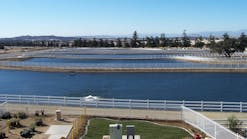Feds, State of Mississippi Announce Clean Water Act Settlement
The U.S. Environmental Protection Agency (EPA), the Department of Justice, and the Mississippi Department of Environmental Quality announced a comprehensive Clean Water Act settlement with the city of Jackson, Miss. Jackson has agreed to make improvements to its sewer systems to eliminate unauthorized overflows of untreated raw sewage and unauthorized bypasses of treatment at the Savanna Street wastewater treatment plant (WWTP), the city’s largest wastewater treatment facility. When wastewater systems overflow, they can release untreated sewage and other pollutants into local waterways, threatening water quality and contributing to beach closures and disease outbreaks.
“EPA is working with cities to protect the nation’s waters from raw sewage overflows that can have significant impacts on people’s health and the environment,” said Cynthia Giles, assistant administrator for the EPA’s Office of Enforcement and Compliance Assurance. “[This] settlement will lead to improvements in the management of wastewater overflows, which will reduce water pollution and benefit the Jackson community for years to come.”
“This agreement will bring lasting benefits to the people of Jackson by reducing the threats to public health posed by untreated sewage overflows,” said Ignacia S. Moreno, assistant attorney general for the Justice Department’s Environment and Natural Resources Division. “The settlement will bring the city into compliance with the nation’s Clean Water Act, requiring significant upgrades to the existing sewer system. Under the settlement, assistance will be provided to residents to repair sewer connections in lower-income areas that have suffered historically from overflows of untreated sewage.”
The consent decree requires Jackson to implement specific programs designed to ensure proper management, operation and maintenance of its sewer systems. In order to address the problem of wet weather overflows of raw sewage from the sewer lines, Jackson will develop and implement a comprehensive sewer system assessment and rehabilitation program. The city will also develop and implement a comprehensive performance evaluation and composite correction program to reduce the bypasses of treatment at the Savanna Street WWTP.
The consent decree also requires Jackson to develop and implement numerous sewer system capacity, management, operations and maintenance programs, including a pump station operation and preventive maintenance program, a WWTP operation and maintenance program and a water quality monitoring program.
In addition to the control requirements, the consent decree requires Jackson to pay a civil penalty of $437,916. As part of the settlement, Jackson has also agreed to implement a supplemental environmental project valued at $875,000 that will provide additional environmental benefits to the local community. The project involves reducing the flow of water from entering the sewer system by eliminating illicit storm water connections and repairing defective private lateral sewer lines from the low-income residential properties.
Keeping raw sewage and contaminated storm water out of the waters of the United States is one of the EPA’s national enforcement initiatives for 2011 to 2013. The initiative focuses on reducing sewer overflows, which can present a significant threat to human health and the environment. These reductions are accomplished by obtaining cities’ commitments to implement timely, affordable solutions to these problems, including the increased use of green infrastructure and other innovative approaches.
The United States has reached similar agreements in the past with numerous municipal entities across the country including Mobile and Jefferson County (Birmingham), Ala.; Atlanta and Dekalb County, Ga.; Memphis, Knoxville and Nashville, Tenn.; Miami-Dade County, Fla.; New Orleans, La.; Hamilton County (Cincinnati), Oh.; Northern Kentucky Sanitation District #1 and Louisville MSD, Ky.
The proposed consent decree with Jackson is subject to a 30-day public comment period and final court approval before becoming effective.
Click here for more information about the settlement.
Click here for more information on EPA’s national enforcement initiative.






